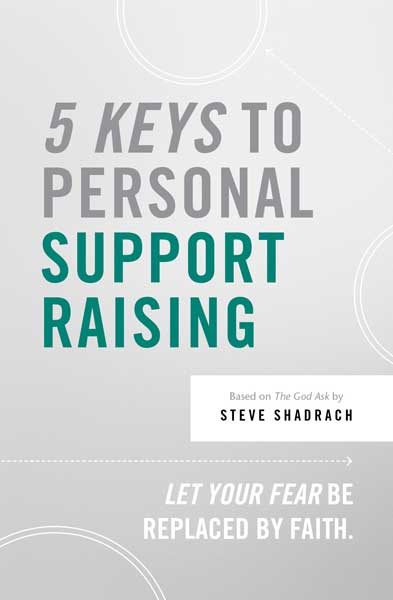
For whatever reason, support-raising brings so many emotional extremes to our lives. From the highs of seeing God provide in seemingly impossible ways to the lows of underfunded ministers with few options left, a life of support-raising is susceptible to big mood swings. Why is this? Why is ministry partner development the one area that can cripple an otherwise effective missionary?
There are a few good reasons; however, the one I see most often isn’t because of how bad a support-raiser is. Rather it is the good intentions of the minister that are often the beginning of issues. After all, why did we choose this life of ministry? We don’t do this because of the sweet perks and high salary. We do it because of a passionate call God put on our hearts—a calling that many of us dedicate our lives to because of the advancement of the Gospel. And we are prepared to sacrifice much so that this calling is fulfilled…even if it means taking a few shortcuts in support-raising to make this happen.
What can start as a few postponed appointments can snowball into some serious spiritual self-inflicted problems. The irony we see is that missionaries resemble Paul on the mission field but act like Adam and Eve evading the Lord in the Garden when it’s time to talk about how underfunded they are. Let’s discuss how we can help our underfunded staff by pastorally shining some light and putting some practices in place to avoid this issue all together.
While we are people of faith, what responsibilities and roles are ours to claim?
It’s one thing to have the faith to say, “God will provide.” It’s an entirely other and more impressive thing to invite people to be a part of the work of God through financial partnership.
-One thing I believe is important is to put in your own theological work. I’ve often found that when people reach an uncomfortable stretch in their support-raising journey, they often fall back to their biblical conviction. Unfortunately, I’ve seen what happens when people don’t have any real biblical convictions about support-raising. Not a lot gets done! What are your theological convictions regarding support-raising? Do you have any gaps or resistance? It’s okay to have resistance or doubts regarding a biblical view of support-raising! But staying in that place while doing no biblical or theological work doesn’t help anyone.
-You need to also have a plan and commit to putting in the work. We will sometimes have workers ask us for help or program dollars. While we can sometimes help via program dollars, we often ask them for some receipts. Have they put in the work, calls, appointments, follow up, etc.? If they avoid anyone in their call list, why is that? How big is that self-imposed do-not-call list?
-You need to be aware of a planning fallacy. The planning fallacy refers to a prediction phenomenon, all too familiar to many support-raisers, wherein people underestimate the time it will take to complete a future task, despite knowledge that previous tasks have generally taken longer than planned. When plans fail and emotions rise, it’s important to take a step back and ask, “why did this happen?” It is common for newer support-raisers to make a plan that fills them with good feelings, which causes a false sense of security, which causes procrastination and leads to a stressed-out missionary who isn’t fully present in their asks.
Ultimately, what should we leave to the Lord? What burdens should we submit in prayer instead of carrying on our own shoulders?
-Results. I have seen so many people say, “my goal for this week is to get 5 new partners.” That’s great if it happens! But it is hugely disappointing if it doesn’t. Ultimately, this is not your call. Your job is to present and invite. That’s it. Leave the yes’s and no’s up to God working through your potential partner.
-Openness and the shame we feel. Why is this? I have personally felt this. I am ready to publicly confess my deepest and most awkward sin…but I am not willing to tell too many people if I’m underfunded. This shouldn’t be a surprise. Support-raising is deeply tied to our calling. Failure here sounds like a failure in the ministry. We need to practice acknowledging this shame and verbally professing this shame is not from our God.
-The temptation of catching up/overwork. Is it healthy to double up on work after missing a week? Not really. Support-raising is allowed to be a fun, joyful time with God and others who share your passion! It becomes less so when you impose unnecessary time constraints.
-Reliance on me instead of God. When I get stressed, I work hard…but sometimes forget to pray. It’s worth it for me to ask if I’m a Christian in my ministry but agnostic in how I truly think it’s funded.
A few practical tips:
1) When you are making goals, are you completing them? Or are you constantly failing? Before you get the sackcloth and ashes, find out why this may be happening. Make sure you have achievable (smArt) goals.
2) If you are not fully funded, are you sharing that with someone other than your supervisor? Who is helping you carry this yoke?
3) Do you have an unhealthy fear of rejection? Part of this can be personality, but not all of it. What do you think you are doing in these appointments? Is this partnering with others so that this work of God can be done? Or just asking people for money for you to be sent? If you have a huge fear of rejection, you need to drop everything and do some self-work.

